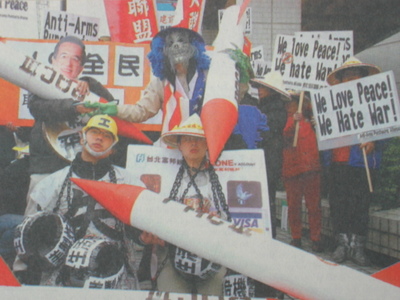From Johnny Neihu’s Saturday column in the Taipei Times:
Anyway, after a long day of clack-clacking [mahjong tiles] and shots of icy beer…I read an article that had been printed off the Internet by one of my more English-savvy friends from the mahjong marathon. It was a June 3 piece called "The Perils of Threat Inflation" by one William Lind*,and brought me back to such a level of agitation that I wished I hadn’t read it. I’ll be honest: I was so scandalized that the three or four schoolgirls opposite me in the [subway] carriage turned off their iPods to watch and hear an old man self-combust.
What got Johnny into such a state was Lind’s suggestion that China’s claims on Taiwan were legitimate, and that the U.S. should butt out.
Instead of repeating Johnny’s points for him, I’ll just quote from Mr. Lind’s column, and raise a few objections of my own:
Under its "one China" policy, the U.S. recognizes that Taiwan is part of China.
Sorry Mr. Lind, but that’s not quite true. The U.S. acknowledges China’s position that it has a claim to Taiwan, but it’s wrong to say that it recognizes it.
In the same manner, I can acknowledge that the crazy-ass president of Iran thinks he has a right to develop nuclear weapons and wipe Israel off the map.
But I certainly don’t recognize him as having any such right whatsoever.
Lind then tries to explain why poor little China will be forced against its will to put the Taiwanese in their place:
Taiwan is vastly important to China, because the great threat to China throughout its history has been internal division. If one province, Taiwan, can secure its independence, why cannot other provinces do the same? It is the spectre of internal break-up that forces China to prevent Taiwanese independence at any cost, including war with America.
Reality check here: Taiwan has NEVER been controlled by the People’s Republic of China. Moreover, within the last century, Taiwan was only a part of a "Greater China" for a couple of years following World War II. That means that it’s essentially been separate from Greater China for a hundred years now. And in spite of this, Communist China has miraculously managed to maintain its internal cohesiveness during its entire 50 year lifespan without collecting a single NT dollar in taxes, without imprisoning a single Taiwanese democracy advocate, and without murdering a single Falun Gong adherent.
Maybe, just maybe, it’s an exaggeration then to say that Taiwanese independence is the single magical element that can bring the whole Chinese house of cards crashing down.
Next, Lind looks to history for an excuse not to get involved:
A strategic rivalry between the U.S. and China points to an obvious parallel, the strategic rivalry between England and Germany before World War I.
[…]
America needs to handle a rising China the way Britain handled a rising America, not a rising Germany.
I think the World War I analogy useful, but draw rather different conclusions from it than Mr. Lind does. To begin with, it’s an error to think that World War I occurred because of some kind of "strategic rivalry". The Great War started because of German militarism, pure and simple. Donald Kagan’s book, On the Origins of War and the Preservation of Peace, outlines Britain’s dilemma:
The question is, what "accommodation" could the European states have made to the German "upstart" that would have brought satisfaction to Germany and stability to Europe? What, in fact, did Germany want? At the turn of the century, Germany was the strongest military power in the world. It also had the strongest and most dynamic economy on the Continent. In 1897, without any previous naval tradition, without any new challenge from the sea to require an expensive change in policy, the Germans undertook the construction of a major battle fleet concentrated in the North Sea where it threatened British naval superiority and the only security available to Britain. The British gradually became alarmed as they came to recognize the threat Germany posed.
…their fears were well-founded. However often the Kaiser might proclaim his friendly feelings for England and Tirpitz declare that the fleet had no offensive purposes, the continued construction of big battleships concentrated in the North Sea and the acceleration of that construction justified British suspicion and fear, even without inside information about German intentions. Scholarship, of course, has now made clear that Britain really was the target of the new German Navy and that the likeliest explanation of Tirpitz’s otherwise irrational naval program is that it aimed at least at equality with the British fleet; when combined with Germany’s military power it would give the Germans the ability to change the status quo in its favor and to the great and dangerous disadvantage of other powers…It would be some years before the Germans could hope for parity at sea, but the British expected that even before the Germans were prepared for a confrontation at sea, they would try to use their "risk" fleet to force concessions.
(Kagan, p 206-207)
Some clue as to what these concessions might have looked like in the long run can be drawn from German Chancellor Theobald von Bethmann Hollweg’s "September Program" for Europe, which was drawn up a month after hostilities began:
The [German] military would decide whether the French should cede Belfort, the western slopes of the Vosges, the coast from Dunkirk to Boulogne, and destroy their forts on the German frontier…Germany would acquire the iron mines of Briey. A preferential trade treaty would make France "our export land," and the French would be required to pay an indemnity that would make it impossible for them to manufacture armaments for at least twenty years. Belgium would lose Liege, Verviers, and probably Antwerp, and would become a vassal state, accepting German garrisons in its ports…Holland would be ostensibly independent, "but essentially subject to us." Luxembourg would be directly incorporated into the German empire. Apart from these territorial provisions, but by no means less important, was the plan for establishing "an economic organization of Mitteleuropa through mutual customs agreements…including France, Belgium, Holland, Denmark, Austria, Poland, and perhaps Italy, Sweden, and Norway" that would guarantee German economic domination of Europe.
(Kagan, p 208)
Looking at this laundry list, it may be difficult for the modern reader to imagine that most Germans considered Bethmann Hollweg’s demands to be too…moderate. Germans – left, right, and center – wanted more. Of this, Kagan writes:
A "Petition of Intellectuals" published in July 1915 was signed by a great number of theologians, teachers, artists, writers, and some 352 university professors; it demanded a program of annexations that went far beyond the September Program. At the same time…the leader of the Catholic Center party, Matthias Erzberger, was demanding the annexation of Belgium, parts of France, and the entire Congo, the conversion of the Baltic states and Ukraine into German dependencies, and the imposition of a reparation bill that would more than pay off the entire German national debt.
(Kagan, p 209)
In short, if one truly believes that China is some kind of Wilhelmine Germany analog, then one ought to be prepared to receive from China a set of territorial demands and economic concessions far in excess of little old Taiwan. Exactly then, how many OTHER countries are we prepared to sell down the river?
Finally, Lind raises the specter of a nuclear confrontation, which ultimately gets back to the familiar question about whether America is willing to sacrifice Los Angeles for Taipei. A Chinese general asked that a few years back, and Taiwanese (or are they Chinese?) commenters on Taiwan-related blogs ask it as well.
I confess I get a bit confused when I hear the question. You see, China claims that the world has absolutely nothing to fear from it; that it’s peacefully rising. It swears this, up and down, to any and all.
I wonder then, will all that peaceful rising occur before or AFTER they nuke L.A.?**
Putting that aside, Mr. Lind should try to remember that the Cold War wasn’t won by wetting our pants over the possibility of exchanging D.C. for Paris. It was won by facing the communists down, and by betting that they were rational actors who weren’t prepared to to lose THEIR cities in an unjustified war of aggression.
Is America willing to sacrifice Los Angeles for Taipei? My response is to turn that question, which is asked purely in an effort to demoralize, upon its head. What we really should ask is whether it is the Chinese who are willing to sacrifice Beijing for Banchiao***, or Shanghai for ShiminDing****?
If China is tempted to answer that irrationally enough, it may one day find itself boasting of its five thousand year history…while looking forward to nothing more than a fifteen minute future.
* Lind’s column is over at lewrockwell.com. Looking over the site, I can’t help but wonder what Ludwig von Mises would have said if someone had told him that 33 years after his death, the president of the Ludwig von Mises Institute would be writing a column extolling the virtues of anarchy in Somalia.
What the president of the Institute seems to have forgotten is that von Mises was no anarchist – he was a classical liberal. Classical liberals advocate the "night-watchman state" – one which limits itself to protecting life, liberty and property.
That doesn’t make them friends of modern big government, but it hardly makes them "anti-state", either.
** The paradox suggests that the Chinese are lying. But about what? About their peaceful rising? Their willingness to start lobbing nukes around in order to conquer Taiwan?
Or maybe all the above?
*** A city on the outskirts of Taipei.
**** A Taipei shopping district.
UPDATE (Jun 27/06): Are the Chinese willing to sacrifice Beijing for Banchiao? Some speculation here that the Taiwanese might have a few nukes of their own. Not sure how seriously this should be taken.

